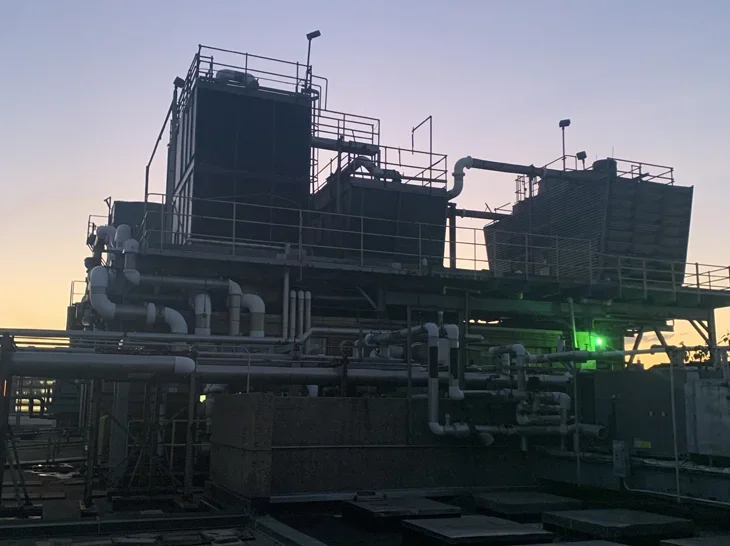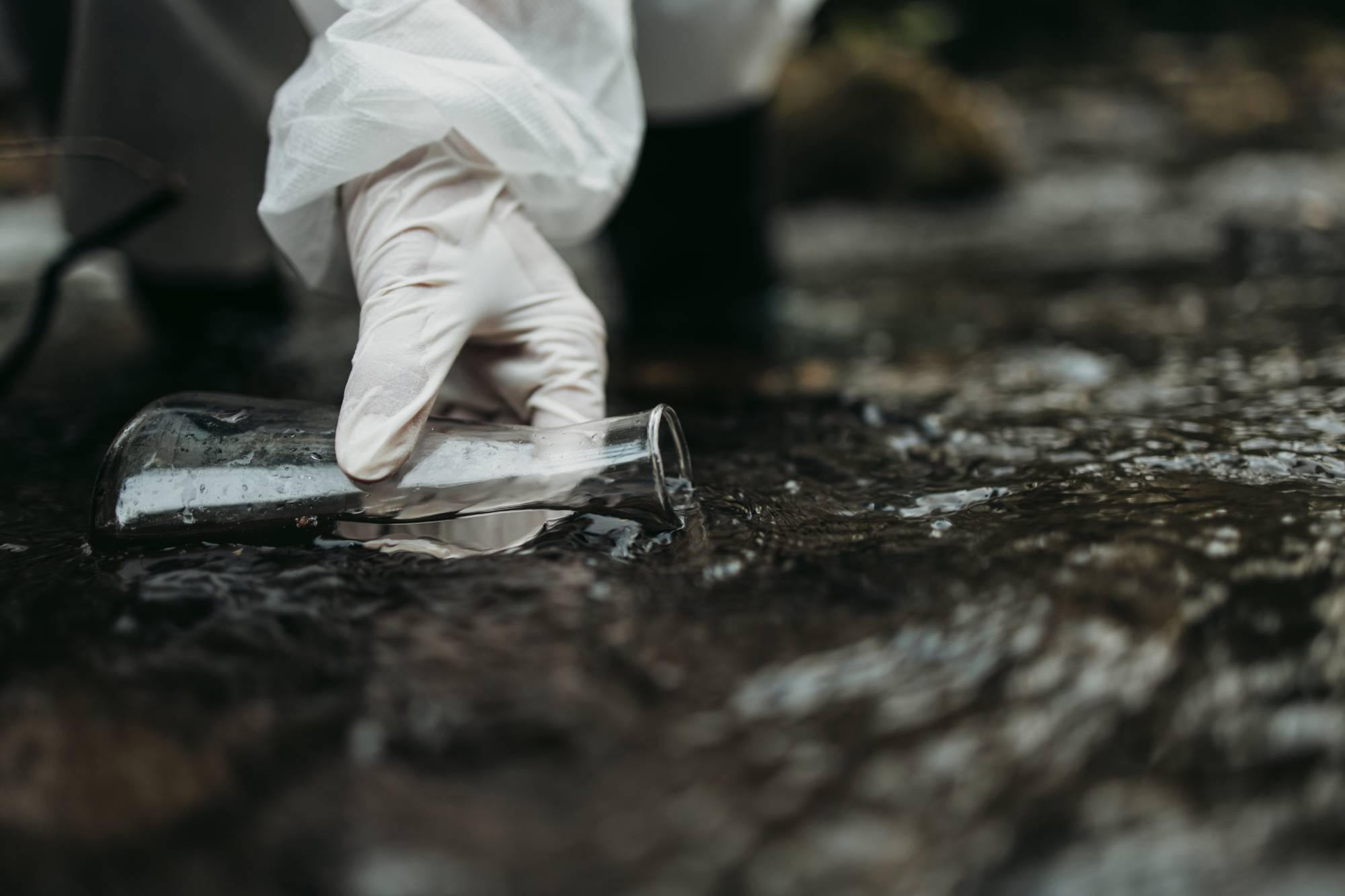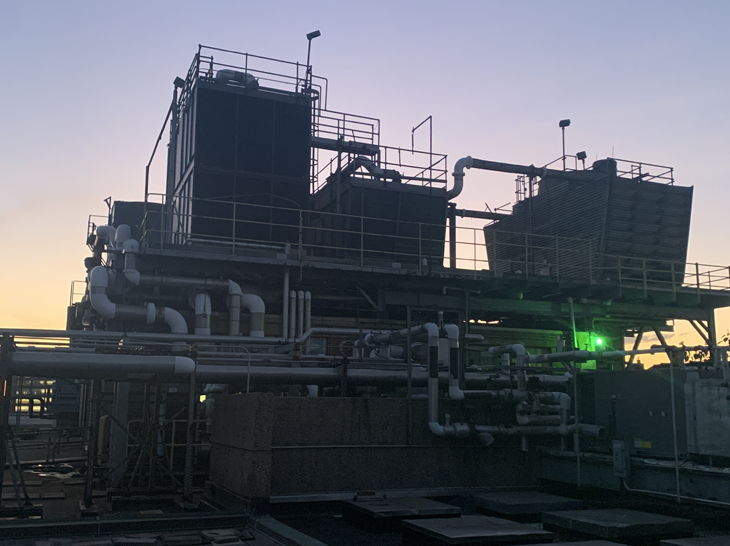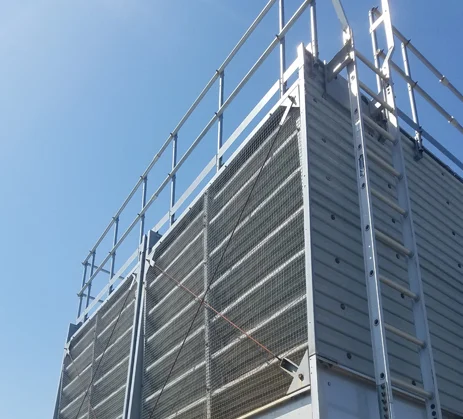
What is the Cooling Tower Water Treatment Program?
Cooling towers are key to many commercial and industrial settings, such as power plants, factories, and manufacturing facilities. They work by cooling water to keep equipment and buildings running at the right temperature.
However, because these towers are exposed to the environment, the water inside can collect dirt and impurities. Without proper management, this dirt and grime can lead to inefficiencies, higher maintenance costs, and even a shorter lifespan.
A well-thought-out water treatment program is crucial to keep cooling towers running efficiently. At Wasak Inc., we specialize in ensuring water safety and compliance, and we’re here to share our insights on how facility managers can create an effective cooling water treatment program.
But first, let’s break down how a cooling tower works.
The Basics of Cooling Towers
Cooling towers remove excess heat from water used in industrial and commercial processes. The basic principle is simple:
- Water heated from industrial processes is sent to the cooling tower.
- Inside the tower, the water is exposed to air, which cools it through evaporation.
- The cooled water is then recirculated to absorb more heat.
Different types of cooling towers serve different functions. A few include:
Open Circuit Cooling Towers: These are the most common type. Water is pumped to the top of the tower and dispersed over fill material. As it trickles down, it directly contacts the air and cools through evaporation.
Closed Circuit Cooling Towers: In these systems, the process water is contained within a coil and does not directly contact the air. Instead, water is sprayed over the coil and cools the process water by evaporation.
Hybrid Systems: Combining elements of open and closed systems, hybrid cooling towers can switch between wet and dry cooling depending on weather conditions or water conservation needs.
Introduction to Cooling Tower Water Treatment Program
A cooling tower water treatment program is a comprehensive strategy designed to manage the quality of water used in cooling towers. The main goal of this program is to treat the water, so it can effectively cool systems without causing damage or becoming a health risk.
Most water treatment programs have a few simple objectives.
Prevent Scale
When water evaporates, it can leave hard mineral deposits on equipment. Also known as scale, these can insulate the heat transfer surfaces, leading to increased energy costs and potential equipment failure.
Control Corrosion
Corrosion can damage the structural integrity of the cooling tower and associated piping. Effective cooling tower water treatment services can prevent the chemical reactions that lead to corrosion, thereby extending the life of the cooling system.
Limit Biological Growth
Warm water systems are ideal breeding grounds for bacteria, including harmful ones like Legionella. A good water treatment program includes biocides to kill harmful microorganisms and prevent their growth.
Components of a Successful Water Treatment Program
Let’s take a closer look at what makes up an efficient water treatment program for cooling towers.
Water Filtration and Purification Methods
The first step is to filter and purify the water to remove impurities and contaminants.
Mechanical Filtration:
Mechanical filtration uses filters to physically block and remove particles and debris from the water. This helps keep the system clog-free.
Chemical Purification:
The water is then treated with chemicals like chlorine or ozone to kill harmful microorganisms and remove other chemicals that may cause damage.
Chemical Treatment Options
Chemical treatments are a must to tackle issues like scale, corrosion, and biological growth.
Scale Inhibitors:
Scale inhibitors prevent minerals from forming hard deposits on equipment and reducing their efficiency.
Corrosion Inhibitors:
These chemicals create a protective layer on metal surfaces to minimize rusting and extend the life of your cooling system components.
Biocides:
Biocides are essential for controlling harmful bacteria growth, so your cooling tower does not become a breeding ground for diseases.
Automation and Control Systems
With modern technology, a significant portion of the cooling tower water treatment program can be automated for better accuracy and less hassle.
Sensors and Monitoring Equipment
Automated systems use sensors to continuously monitor water quality parameters like pH, conductivity, and temperature. Facility managers can use this real-time data to modify treatment processes as needed.
Control Systems
Control systems automatically adjust chemical levels based on the data received from the sensors. This helps maintain optimal water conditions without constant manual intervention.
Data Logging and Remote Management
Since modern systems log data remotely, facility managers can monitor water quality and system performance from anywhere, at any time.
Benefits of Implementing a Water Treatment Program
A well-designed cooling tower water treatment program has several operational, economic, and environmental advantages.
Enhanced Efficiency
A clean cooling system doesn’t have to work as hard. It uses less energy to achieve the same cooling effect, boosting overall system efficiency.
Less Downtime
With fewer breakdowns and less wear and tear from impurities like scale and corrosion, your equipment stays up and running more reliably.
Increased Equipment Lifespan
Proper water quality management protects your cooling towers and associated machinery from excess wear and tear, thereby extending their useful life.
Cost Savings
Less energy consumption and fewer emergency repairs mean lower operating costs. Plus, extending the lifespan of your equipment postpones expensive capital investments.
Predictable Maintenance
Regular, planned maintenance helps avoid unexpected repair bills and keeps budgeting more predictable and manageable.
Water Conservation
Effective water treatment helps reduce total water usage by increasing the number of times water can be cycled through the system before it needs to be discharged and replaced.
Lower Carbon Footprint
Improved efficiency translates into less energy usage, which means lower greenhouse gas emissions from your cooling systems.
Wasak Inc: A Trusted Name in Cooling Tower Water Treatment
If you own or manage a cooling tower, you may be looking into cooling water treatment options to keep your system clean, efficient, and durable. However, since every system is unique, figuring out the best treatment option for your needs can be tricky. Consider speaking to a water treatment specialist to understand your options and make the right choice for your system.
Do you have more questions about cooling tower water treatment? The team at Wasak Inc. will be happy to answer them! Set up a consultation with us today, and let’s talk about what we can do for your cooling tower.
Related Blog
-

Understanding the Importance of Generalized Water Testing
It’s no secret that water is an essential aspect of our lives. From drinking and cooking to showering and cleaning, water is a vital resource
-

The Importance of Closed and Process Loop Services: Maximizing Efficiency in Industrial Systems
Hydronic heat transfer systems have been the backbone of industrial cooling systems for a long time. But as energy costs rise, industrial cooling systems are
-

Cooling Water Treatment and Environmental Compliance: Navigating the Regulations
Maintaining optimal water quality is vital in industrial cooling towers. Contaminants such as minerals and impurities can lead to scaling and corrosion, reducing the efficiency
